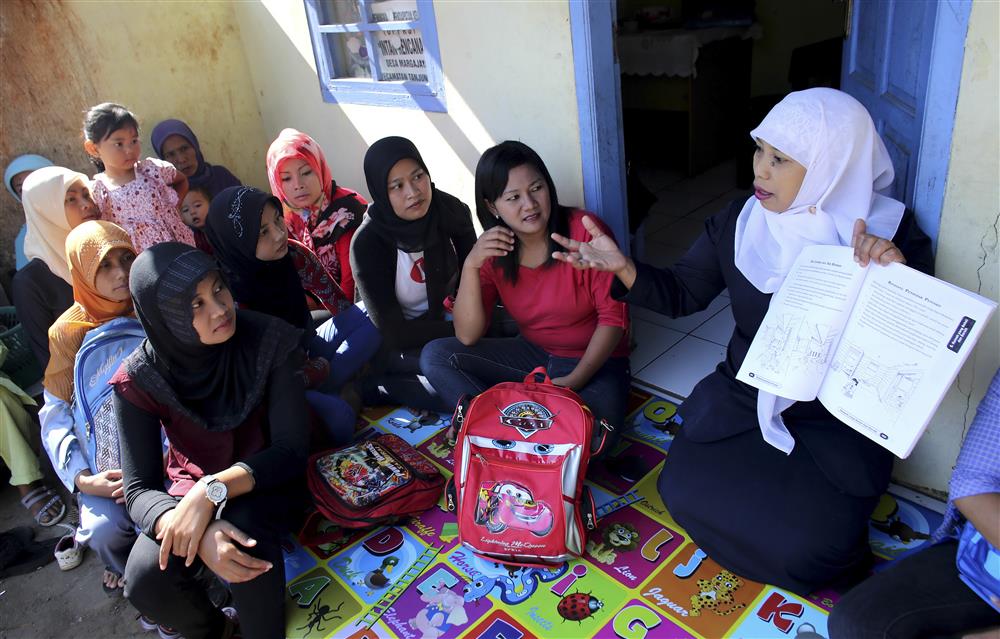Child Development Monitoring for Rural Areas
- Solution
- Child development monitoring for rural areas
- Organization
- Suryakanti Foundation Center
- Country of Implementation
- Indonesia
- Region
- Asia & Pacific
- Subregion
- Southeast Asia
- Start Year
- 1984
- First published
- 31.01.2018
Solution details
People
“We are happy to receive reports from parents that our pupils do well. Some of them ranked 1st in their class, some achieved well in sports.” Syarifah, health worker
Yayasan Suryakanti Bandung is a non-profit foundation that specializes in supporting infants and children at high risk for disability through early detection and intervention in rural areas of Indonesia. To that end, it established the Suryakanti Foundation Centre for the development of child potential and to provide clinical services and education for children with disabilities aged 0–8 years. From 2014 to 2016 approximately 18,000 patients were served.
Problems Targeted
The first five years of life are crucial for a child’s physical and cognitive development; thus, it is important to regularly record and monitor such developmental progress. Early detection and proper intervention of developmental disorder can reduce the severity of the condition and help children adapt in school and in life further on. Developmental screening is not part of a routine examination in Indonesia, however, especially in rural areas. Lack of professionals and the large population make it necessary to involve mothers and village health officials to improve child development monitoring.
Solution, Innovation and Impact
The Suryakanti Foundation Centre provides clinical services and education for young children with disabilities as well as parental instruction on how to care for children with a disability. In addition, the centre has developed innovative tools for early detection and intervention, particularly in rural areas. One tool is the pictorial home-based developmental milestone chart, whereby parents and primary health workers are trained to monitor the development of every young child from birth to five years, including an interpretation guideline and a manual for follow-up intervention. The centre provides training for state health officials, who in turn train mothers on how to use the toolkit, and it asks for their feedback to improve the kit’s usage. This pictorial developmental chart is later integrated into the Road to Health Card of each child to show the causal relationship between a child’s nutritional status and developmental delay.
Funding, Outlook and Transferability
The Road to Health Card was disseminated as part of an early childhood development initiative in more than 12 provinces and 22 districts across Indonesia. The pictorial milestone itself and the attached manual for early stimulation has been distributed; and so far about 3,000 women have been trained in the home-based developmental milestone programme for young children, sponsored by UNICEF. In 2015 the pictorial milestone was adapted as a policy on holistic integrated early childhood development, but the implementation is still limited. The foundation believes that the various activities can be replicated by using networks and partnership and through professional associations. It has received interest from South Africa and other countries of South East Asia to replicate the model.
Media
Life Story

THE STORY OF SYARIFAH, HEALTH WORKER USING CHILD DEVELOPMENT METHODS OF THE SURYAKANTI FOUNDATION
“Parents report that our pupils do well, some even ranking first in their class.”
My name is Syarifah and I am a health cadre in the town of Tanjungsari, located in the city of Sumedang. For more than a decade I have served in Taman Posyandu, a health-post with a playgroup, witnessing how generations of toddlers have come and grown. Like most women in our village, at first I knew only a little about child development. We believed that children would simply grow naturally. Then, during a health-post training, I joined a session about child development presented by the Suryakanti Foundation. We were taught that to thrive, children need more than just food, clothes, and sleep. We were taught about how we should foster the child’s ability through play and that we must pay attention to any sign of developmental delay, so that we can then stimulate them to catch up. We are happy to receive reports from parents that our pupils do well. Some of them have ranked first in their class, some have excelled in sports. The important thing is that they all grew into happy, healthy, confident kids. We do this work voluntarily, but having the parents thanking us and seeing the children succeeding in school are simply heart-warming. We hope that child development training can be held more often, particularly to train new cadres as well as to refresh our own skills. Then we can prove that although the possibilities in rural areas are limited, our village babies can learn and succeed.
Related information
- Connections
- 2
-
Organization
- People